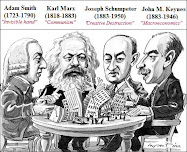By: KAREN HORN
John Maynard Keynes is high in the list of bestselling books now. Adam Smith is not quite as popular. The reason is not that books from the 18th century tend to be a demanding read: Keynes's General Theory of Employment, Interest and Money, although from the 20th century, is no piece of cake either. Instead, the present global financial crisis has made the godfather of classical economics look strikingly irrelevant in comparison with Keynes, the inventor of modern disequilibrium theory.
Even worse, now that bankers are being castigated as the incarnation of greed, blindness and irresponsibility, the man who wrote in his famous Inquiry into the Nature and Causes of the Wealth of Nations that "it is not from the benevolence of the butcher, the brewer, or the baker" - or perhaps the banker in our day - "that we expect our dinner, but from their regard to their own interest" is again accused of being the chief advocate of heartless laissez-faire capitalism, a system that failed and had to fail. In this view, capitalism is nothing but a false religion, with Mammon as its god and Smith as its high priest. Critics worry that markets need a moral foundation that they automatically erode. They ridicule the naïve belief that free markets bring everybody happiness at no cost, a conviction allegedly lacking all philosophical underpinnings.



0 comments:
Post a Comment